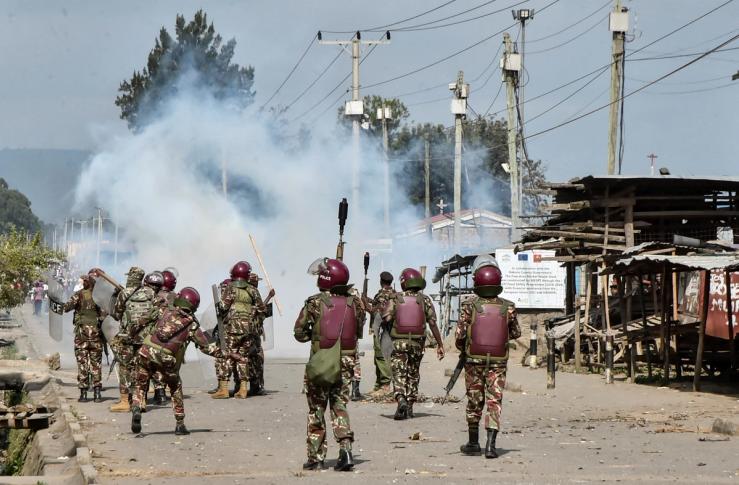The News
Rising political unrest in Kenya is driving local investors to adopt a “wait-and-see” approach while businesses reel from the impact of nationwide protests, investors, business leaders, and analysts told Semafor.
Deadly protests in the capital Nairobi on Monday cost an estimated 10.4 billion shillings ($80.3 million) in lost productivity, according to a local media calculation based on GDP data, as access into the city was completely blocked off by security officers. Several businesses including supermarkets and electronics stores have also been targets of looting since last week.
Seventeen other of Kenya’s 47 counties are also estimated to have lost billions of shillings due to the protests commemorating a 1990 pro-democracy anniversary and reflecting rising discontent with the current administration of President William Ruto. Thirty-one people were killed and 107 injured in Monday’s protests alone, according to the Kenya National Commission on Human Rights.
Luke Mulunda, chief executive of Kenyan business publication Business Today, described the impact of the unrest on small to mid-size businesses as “huge and negative.” He expects investors to remain cautious over the next two years as political risk is likely to rise further as the 2027 general election approaches.
Ian Mwangi, a Nairobi-based economist, predicted that insurers would raise premiums for businesses in centrally located districts over fears of further unrest.
“Small businesses have been hit the hardest, the depressed market means their revenues are declining and many of them are finding themselves with new expenses including fortifying premises, taking out insurance and hiring additional security,” he said.
Know More
Speaking on condition of anonymity, a foreign investor in Kenya’s microfinance industry warned that the underlying issues behind the protests — including perceived government corruption and aggressive taxation measures — risked slowing down flows of foreign direct investment (FDI) into the country.
“Private sector debt is going to dry up as well, because the private markets look at the government line of approach, and the perception of Kenyan risk is going up and up and up,” he told Semafor.
Step Back
“This started as an economic problem, with last year’s finance bill protests, but it has evolved into a political problem — and that can only have a political solution,” Mulunda said. “The problem is not just the protests but also the government response to it,” he said, referring to the killings of protesters by Kenyan police and still emerging cases of police brutality that have stoked fresh public anger against Ruto and his administration.
Questions have been raised following the latest unrest about the alleged association of armed protesters — referred to locally as “goons” — who have led looting in many instances, with pro-government politicians, who have rejected the allegations. In multiple instances, however, goons have been captured on video walking alongside police officers, or assaulting protesters as officers watch.
The government is backing controversial new proposed legislation that would introduce tough regulations on protests, citing the need to protect lives and property.
Martin’s view
While business owners are directly affected by disruption due to the protests, they also stand to benefit the most should the protests result in significant changes in policy and governance. Kenya’s disillusioned young population is demanding far-reaching changes including action against corruption, accountability for security officers implicated in the killings of protesters, and more jobs.
Slowed economic growth in Kenya over the past year has been attributed by the World Bank to “floods, high interest rates, and subdued business sentiment following protests and reduced development spending.” This is despite some positive macroeconomic indicators including declining inflation and stabilized exchange rate.
A resolution of the protests would likely improve business sentiment and stimulate economic growth. But a resolution looks unlikely in the short term, with young people demanding Ruto’s resignation and the government digging in. Opposition politicians are also amplifying the negative sentiment against the administration, with their eyes on the 2027 polls. This all means that the political temperature, and the associated risk for businesses and investors, will continue to rise.
The View From A business owner
Joseph Macharia’s Superb Sounds electronics store in downtown Nairobi was among the businesses attacked by looters during protests last month. He estimated that property worth nearly $2,000 was either stolen or destroyed at his shop.
“The police are failing us. Why haven’t we seen an operation to arrest the goons?” he posed. “There is a lot of CCTV footage from all these businesses.”
Macharia, who is counting on insurance to mitigate his losses, said he expected more street clashes in the coming weeks and months. “I don’t know when things will turn around,” he said. “It’s not like we were doing so well even before the protests, so it’s even worse now for us.”
Notable
- The UN High Commissioner for Human Rights Volker Türk on Tuesday called for “prompt, transparent and independent” investigations into the killings, describing recent events as “deeply troubling.”



